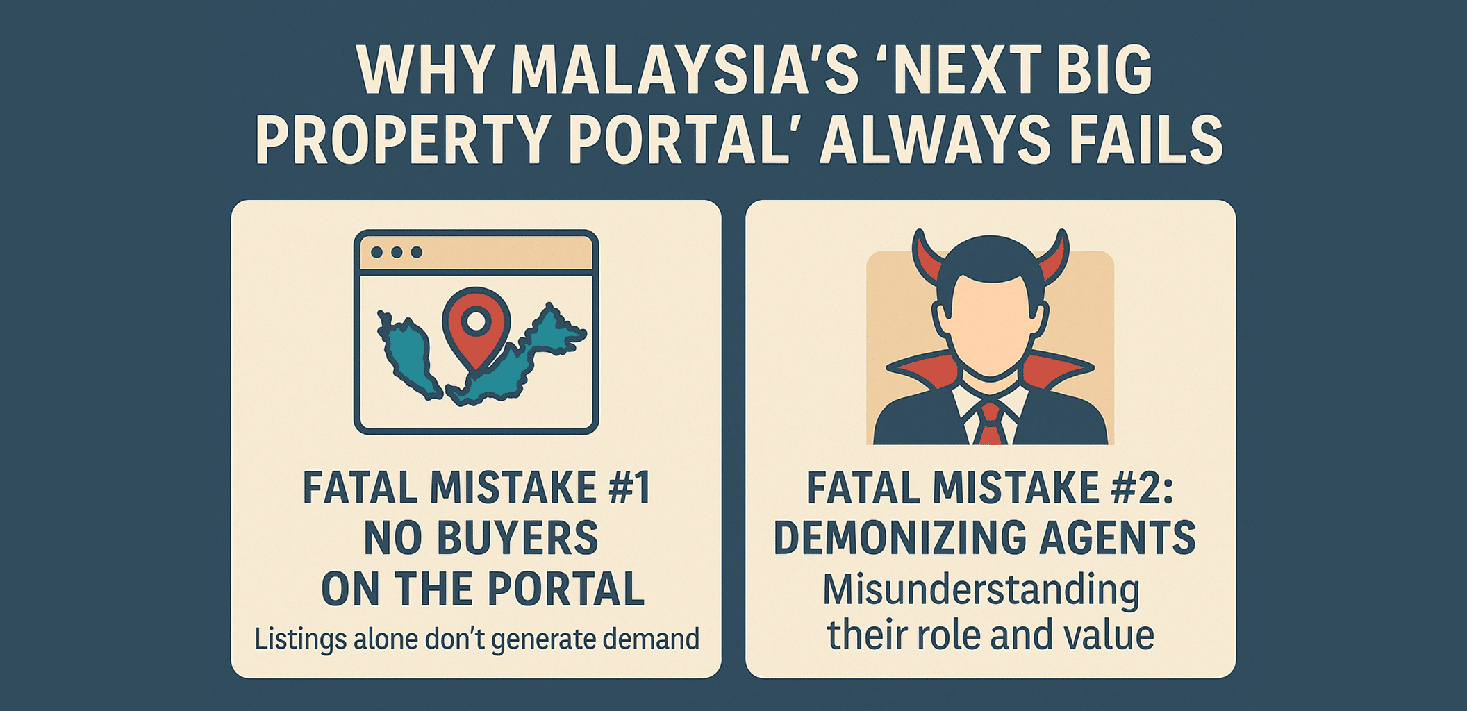Why Malaysia’s “Next Big Property Portal” Always Fails: Two Fatal Mistakes No Proptech Learns From

Every year—for the past 20 years—Malaysia sees a familiar announcement: “We’re building the next big property portal.”
Each one claims to be different. They focus on local services, offer cheaper subscriptions, or promise to remove agents altogether. And every time, the pattern repeats: they arrive with great ambition, shiny branding, and large budgets—and within a few years, they quietly vanish.
Meanwhile, the same few incumbent portals remain firmly on top, just as they have for two decades.
So, what went wrong? Why do new portals—no matter how well-funded—keep failing? It all comes down to two fundamental economic mistakes that defy market gravity.
Mistake #1: Believing “Listings First, Buyers Later”
Before building a portal, founders must ask the only question that matters: “Do I have buyers?”
If you can reliably bring buyers, your portal will succeed. If you can’t, nothing else matters.
Many new portals reverse this logic: "We’ll get listings first. Then the buyers will come." This is fundamentally wrong. A property listing has no value without demand behind it.
Here’s the inevitable, silent death spiral:
- You convince a few agents or owners to post listings.
- They wait for enquiries. None come.
- They realize they’re wasting time and resources.
- They stop posting, and your portal quietly dies.
No agent—and no seller—will keep uploading to an empty room. Listings without traffic are dead inventory.
A portal’s foundation isn’t its database; it’s its demand base. Traffic creates trust, and trust attracts supply. You can’t attract sellers without buyers, and you can’t attract agents without leads. If your first goal isn’t solving buyer acquisition, your portal will follow the same path as hundreds before it.
Mistake #2: Treating Agents Like the Enemy
The second—and often fatal—mistake is demonizing the real estate professional.
Many new portals frame their value proposition as: “We’re cutting out the middleman,” or “No more commissions.” It sounds efficient, but it’s built on a deep misunderstanding of the property market.
Agents aren’t friction—they’re functions.
They perform critical, risk-absorbing roles:
- Qualify buyers from dreamers.
- Price listings realistically.
- Manage viewings, negotiations, and documentation.
- Push deals through financing, valuation, and legal closure.
- Absorb the time, cost, and risk sellers can’t.
If you remove agents, you’re not simplifying the process—you’re transferring the workload to unprepared users. That’s why “direct dealing” platforms always stall. Sellers don’t want to manage calls and paperwork, and buyers rarely trust unverified data or amateur negotiations.
In the end, both sides go back to agents—the very professionals the portal tried to eliminate. The market has already decided: Agents remain the essential backbone of property transactions. Ignore that truth, and you’ll spend millions fighting gravity.
The Brutal Reality: 20 Years of Repetition
Scroll through the last two decades, and you’ll find the same failed storyline:
- New portal launches with bold claims and funding.
- Struggles with user adoption.
- Burns cash chasing listings.
- Fails to generate real buyers.
- Fades quietly.
They failed not because their tech was bad or their UI was weak, but because they ignored market physics:
| Failure Point | The Economic Law Ignored |
|---|---|
| Low Traffic | No buyers = no business |
| High Friction | No agents = no execution |
The survivors in this industry didn’t win by being flashy. They won by being grounded in traffic, trust, and transaction flow. You can’t fake gravity.
Final Thought: Build for Gravity, Not Against It
If you’re planning to build the “next big portal,” start with humility and hard economics.
Ask yourself these two questions—and don’t move forward until you can answer them honestly:
- Do I have buyers? (Because without them, no one will keep listing.)
- Do I respect agents? (Because without them, no one will close.)
Every failed portal ignored these laws. Every lasting one obeyed them.
If your model fights what the market has proven for 20 years, you’re not disrupting the industry—you’re just funding the next obituary in Malaysia’s portal graveyard. Real estate is won by market alignment, not just tech promises.











































































































